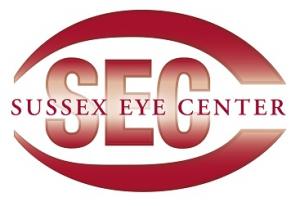What Is Your EyeQ?
At Sussex Eye Center, we love when patients ask us questions! The more educated you are about your eyes, the more comfortable you feel about making decisions regarding your eye health and the better equipped you are to protect your vision. Here are some questions that patients frequently ask us about their eyes:
1. What is Astigmatism?
Astigmatism is a refractive error, which means it is NOT an eye disease or health problem. Just like nearsightedness (myopia) or farsightedness (hyperopia), astigmatism means that your eye isn't focusing light directly on the retina, causing blurry vision. This is a simple fix - glasses or contacts can correct refractive error! Glasses direct the light so it focuses as a single point on the back of your eye, allowing you to see clearly. In an eye with astigmatism, it is shaped more like a football than a soccer ball, so this means your glasses prescription has to focus light slightly differently horizontally and vertically in order for you to obtain the best vision.
2. What is Glaucoma?
Glaucoma is a disease where increased pressure in the eye leads to damage of the nerve fibers in the back of the eye. This occurs at the optic nerve, the cable that connects the eye and the brain. If damage occurs, it can lead to tunnel vision and irrecoverable vision loss. Because people rarely "feel" high pressure in their eyes and the disease is already very advanced when you notice the vision loss, it is important to have an annual eye exam. At every exam we test the pressure of your eyes and if we notice any damage to your optic nerve, we have the technology to diagnose and monitor your condition. If you are diagnosed with glaucoma, the treatment is usually as simple as taking an eye drop to lower your eye pressure.
3. Why Can't I Sleep In My Contact Lenses?
Contact lenses are a medical device and should be cared for, cleaned, and replaced regularly, as you would any other medical device. People who sleep in their lenses are 6-8 times more likely of having an eye infection. Contact lenses are like a sponge - they absorb the protein and debris that collects in your tears. Unfortunately, this is the preferred environment and food for bacteria that can cause severe eye infections. Wearing contact lenses on your eyes is also like wearing a bag over your head - it reduces the oxygen that reaches your eye. If you wear contacts longer than recommended it increases your risk for eye infections and other serious complications. Adhering to the cleaning regimen, wear schedule, and replacement schedule recommended by your eye doctor reduces these risks.
4. My Parent Has Age-Related Macular Degeneration (AMD) - What Can I Do to Prevent This?
Macular degeneration is a disease that causes gradual loss of central vision. There are two forms of this disease - Dry AMD, which causes distortion to vision, and Wet AMD, which causes new blood vessel growth and bleeding that can lead to vision loss. What can make this disease so devastating is that it affects the macula, the area of most acute vision. There is no cure for AMD, only ways to decrease the risk of progression and reduce further vision loss. An overall healthy diet rich in leafy green vegetables, not smoking, and using UV protection all help prevent damage to the macula. Routine eye exams will pick up the beginning stages of the disease and frequent monitoring if any disease components are found is the best way to preserve vision.
5. What Is Blue Light?
Blue light has been a hot topic in vision recently. Blue light is emitted from all of our technological devices - tablets, phones, computers. Because technology has a growing role in our classrooms, offices, and life, there has been a lot of talk of how these devices impact our overall health and vision. Because blue light is just inside the spectrum of UV light, there is concern that in such high quantities there could be damage to the eye. While we have yet to see any scientific evidence for or against this, it has been shown that reducing blue light reduces eye strain. We offer a blue-blocking filter that can be added to any glasses - ask our doctors or opticians about it today!
























































